Year 3 Teaching Resources
Explore printable worksheets, digital activities, games and more Year 3 resources, all aligned to the Australian curriculum! The teacher-created resources have all been designed with primary teachers and students in mind to meet the special needs of children as they transition into the middle years of their primary school education.
Carefully curated and thoroughly reviewed by the expert teachers of the Teach Starter team to ensure they're classroom-ready, our Year 3 resources can save you lesson planning time this school year with editable and differentiated options at the ready.
Teach Starter’s Year 3 resources utilise a vast array of resource types and have something for every learning area. Here's just a taste of what you'll find for your classroom!
- Spelling words and English worksheets
- Fractions activities and Maths worksheets
- Social and emotional learning activities
- Narrative writing stimuli
- Language conventions practice
- And so much more!
Are you new to teaching Year 3? Here's a look at what this year of primary school is all about!
What Is Year 3 in Australia?
Year 3 sits right in the middle of primary school for most students in Australia as the fourth year of compulsory education.
How Old Are Kids in Year 3?
The exact age of students will vary slightly by state (and birthday!), but most children in your Year 3 class will be 8 to 9 years old.
What Do Students Learn in Year 3?
Year 3 is a big one for Australian students. Many will sit the NAPLAN tests, and more than a few will hit double digits before the year is through. This is a big year for Maths between the introduction of more complex fractions and formal multiplication, as well as even more skill-building in other learning areas.
Exactly what they're expected to learn will depend to some degree on the state or territory where you are teaching, but here's a look at what your students can expect to encounter in the key areas of the curriculum!
English
Year 3 students continue to develop their reading, writing, speaking, and listening skills in their English lessons. Reading will involve more complex texts, including longer novels, non-fiction texts, and poetry.
Students will also be expected to analyse these texts more deeply, examining themes, character development, and literary techniques. Comprehension skill-building will require deeper analysis of texts and drawing inferences from what is read.
While Year 2 instruction focuses on basic writing skills such as sentence structure and punctuation, this older group of students will move toward more advanced writing skills such as paragraphing, using descriptive language, and organising ideas in a logical way.
Grammar and spelling will also become a greater focus this year, with an emphasis on understanding and applying more complex grammar rules and spelling patterns.
Maths
Fractions feature front and centre of the Year 3 Maths curriculum. Students will learn to identify, compare, and order unit fractions (those being fractions with a numerator of 1), as well as use them in simple problem-solving contexts.
We already alluded to this being a big year for multiplication, and is it ever! Year 3 students learn the basic multiplication facts — such as 2 x 2 = 4 and 3 x 3 = 9 — and they begin to use these facts to solve multiplication and division problems. They also learn to interpret and create simple multiplication and division problems.
Students will have the chance to build upon their understanding of measurement concepts from Year 2, including length, mass, and capacity. They'll learn to measure and estimate using standard units, plus how to compare and order measurements.
Maths students will expand their knowledge of 2D shapes this year, and they will begin to learn about three-dimensional shapes and their properties.
Place value is still a big part of maths, of course. Year 3 students expand their understanding of place value to include numbers up to 10,000, and they learn to read, write, and compare four-digit numbers. They also learn to use place value to solve addition and subtraction problems.
Science
Science instruction in Year 3 is more focused on building a deeper understanding of scientific concepts and their applications, as compared to Year 2. It also emphasises the development of scientific inquiry skills that will help kids become more proficient in conducting scientific investigations and communicating their findings.
Students in Year 3 learn to ask questions, plan and conduct investigations, collect and record data, and communicate their findings as part of their development of science inquiry skills. They spend a portion of the year learning about the characteristics of living things, including plants and animals. Year 3 students will have the chance to explore the life cycles of plants and animals, as well as learning about the needs of living things and their habitats.
While they're learning about things that live on Earth, they're also learning about the planet itself, exploring geological features such as rocks, soil, and minerals. They also explore heat energy and how it can be transferred from one object to another.
Last, but certainly not least, Year 3 students learn about the properties and states of matter, including solids and liquids (gasses are explored later on in primary school).
Humanities and Social Sciences
Building on the foundation set in Year 2, Year 3 HAAS lessons build a deeper understanding of historical events and concepts, as well as exploring the social and economic systems that underpin Australian society.
Students learn about the historical events, people, and places that have shaped Australia's history. They explore the concept of change and continuity over time and learn to use historical sources to investigate the past. Students also study significant cultural events celebrated in our country and how they contribute to Australia's diversity and identity.
Geography instruction will guide students as they learn about the physical and cultural characteristics of places and regions. They'll learn more about the representation of Australia as states and territories, and as Countries/Places of First Nations Australians. Students will also begin exploring Australia's neighbours such as New Zealand, Papua New Guinea, and Indonesia.
Civics instruction sees Year 3 students strengthening their understanding of what it means to live in a democratic society. They will draw upon their own personal experiences to examine why rules are important and to discuss how they can be active participants in the communities to which they belong.
Health and Physical Education
With their bodies rapidly changing, Year 3 students learn about the factors that influence their health and wellbeing, including the importance of good nutrition, hygiene, and sleep. They also learn about social and emotional health, including how to manage their feelings, develop positive relationships, and make safe and healthy choices.
In Year 3, there are a number of different types of safety on tap in lessons, including road safety, water safety, and personal safety. They develop an understanding of risk and learn strategies for staying safe in different situations.
Year 3 students also learn about the importance of being active and informed citizens in their community. They learn about the benefits of volunteering and begin to develop an understanding of the responsibilities and rights of individuals in society.
The Arts
In Year 3, students develop more advanced skills in drawing, painting, and other visual arts techniques. This includes studying the elements of art — such as line, shape, colour, and texture — and beginning to use these to create more complex artworks.
In music class, these children are learning all about musical notation and how to read and write simple music, while drama instruction explores different forms of drama, including role-playing, improvisation, and scripted performance. Students get the chance to learn about the elements of drama, such as character, plot, and setting, and begin to use these to create their own dramatic works.
- Plus Plan
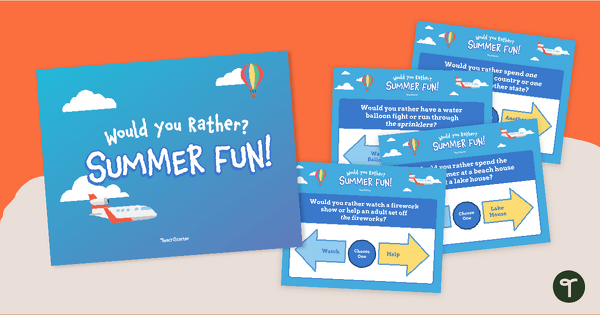
Would You Rather? - End of Year Summer Fun Game
Kick off your summer holidays with a fun “Would You Rather?” Brain Break activity.
- Plus Plan
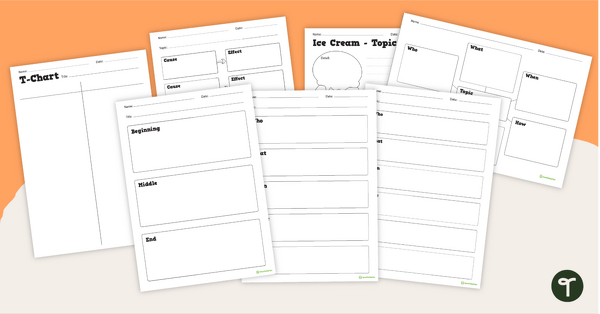
Printable Graphic Organiser Worksheets
A collection of 14 different blank graphic organisers to use in a variety of ways in all subject areas.
- Plus Plan
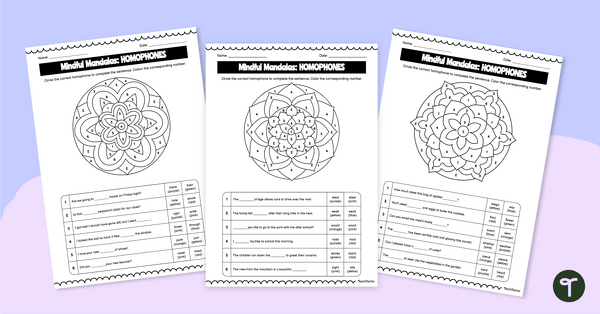
Homophone Mandala Flower Worksheets
Have your students create a colourful mandala flower while simultaneously demonstrating their understanding of common homophones.
- Plus Plan
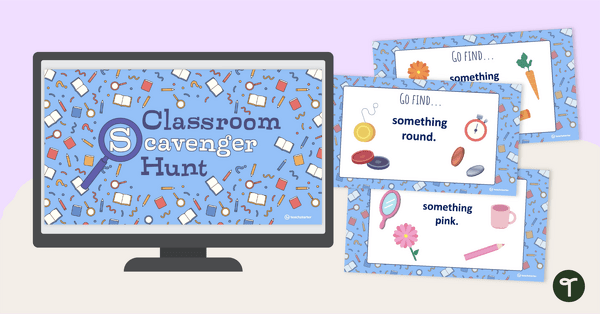
Classroom Scavenger Hunt – PowerPoint Presentation
Take your students on a scavenger hunt to get to know their new classroom environment.
- Plus Plan
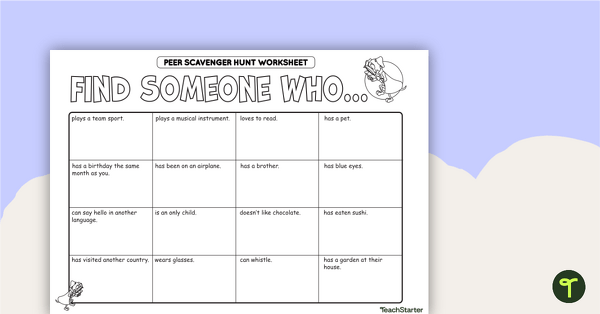
Back to School Scavenger Hunt Worksheet
Build a classroom community and help your students get to know each other with a fun getting to know you activity.
- Plus Plan
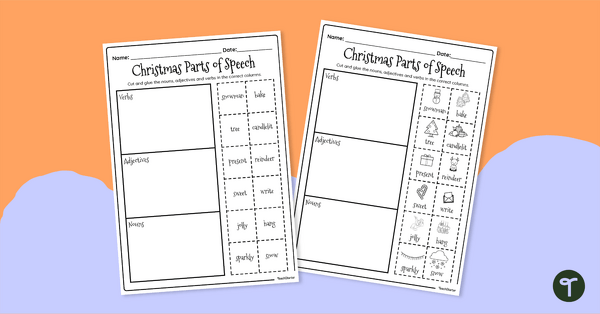
Christmas Printables - Parts of Speech Cut and Paste Activities
Bring a bit of Christmas fun into your parts of speech lessons with printable Christmas worksheets
- Plus Plan
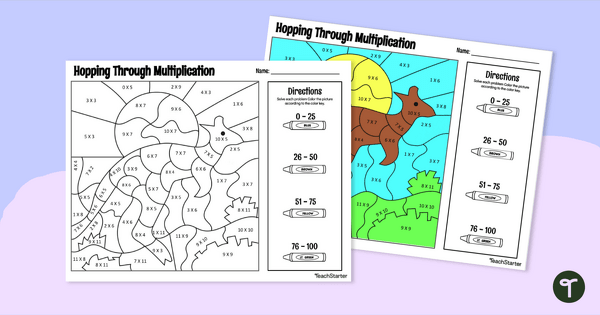
Multiplication Colour By Number Worksheet - Kangaroo
Hop your way through multiplication mastery with a multiplication colour-by-number worksheet.
- Free Plan
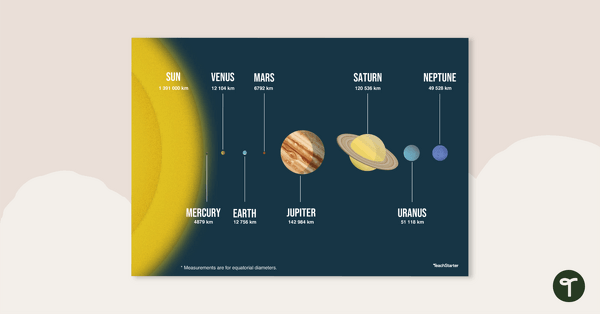
The Solar System to Scale
Display information about the order, scale and the diameter of the planets with this colourful science poster.
- Plus Plan
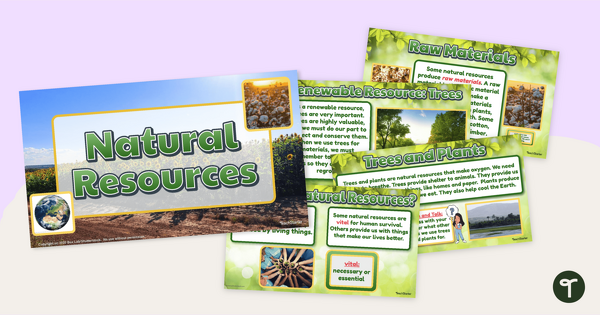
What Are Natural Resources? PowerPoint
A teaching presentation that explores what natural resources are and where they come from.
- Plus Plan
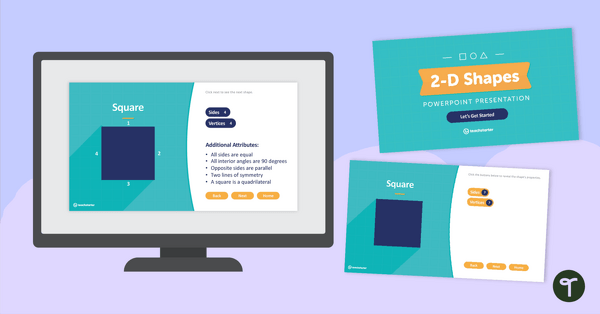
2D Shapes - Interactive PowerPoint Presentation
An interactive PowerPoint presentation that teaches the features of 2D shapes.
- Plus Plan
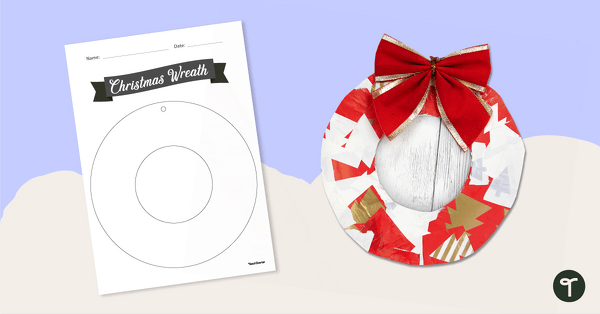
DIY Christmas Wreath Template
Print a DIY Christmas wreath template and explore our teacher team's Christmas wreath ideas for kids!
- Plus Plan
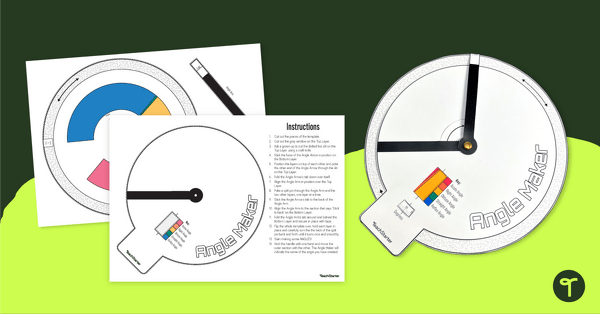
Printable Angle Maker Template
Create and classify some angles with this hands-on printable that is super fun to use.
- Free Plan
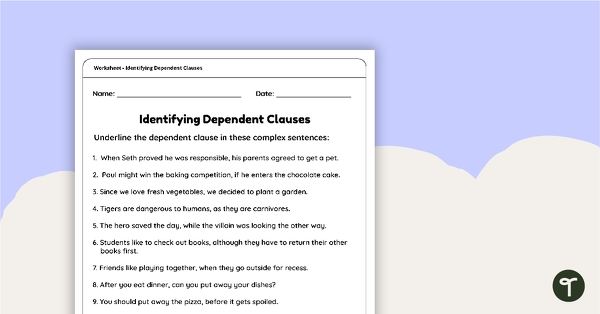
Identifying Dependent Clauses Worksheet
Practise identifying dependent clauses in complex sentences with a dependent clause worksheet.
- Free Plan
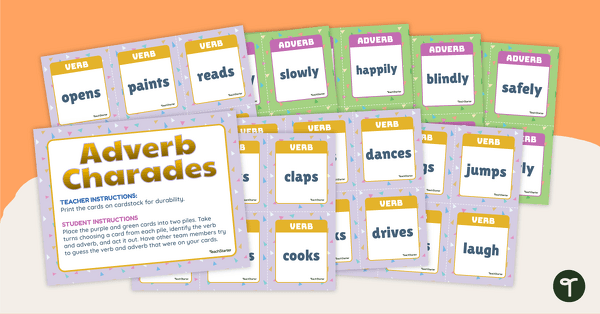
Adverbs Activity : Grammar Charades
Have some fun and build grammar skills with an adverb charades activity.
- Plus Plan
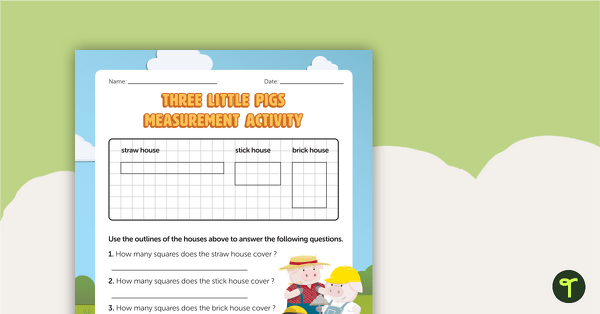
Three Little Pigs Area Measurement Worksheet
A measurement activity to help students understand how to measure area in squares.
- Free Plan
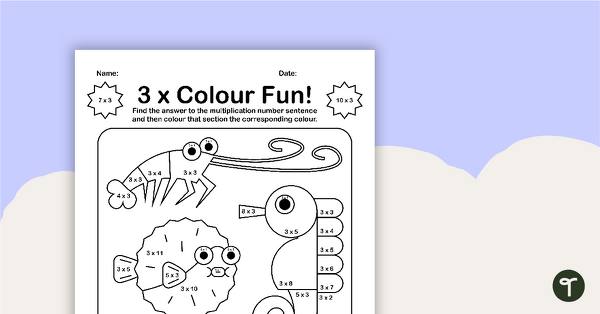
Colour by Number - 3 x Multiplication Facts
An engaging activity to consolidate your students' understanding of multiplication facts.
- Plus Plan
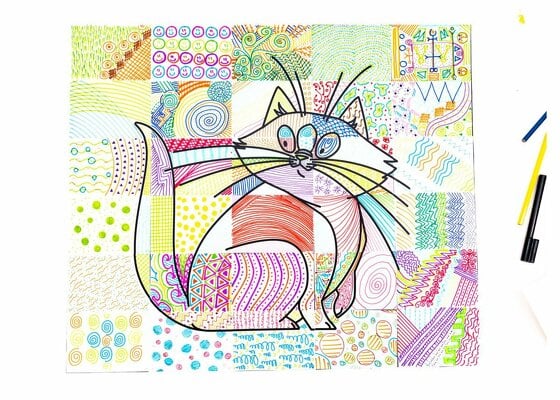
Pattern to Picture Activity
A fun art activity to experiment with the use of line and pattern.
- Plus Plan
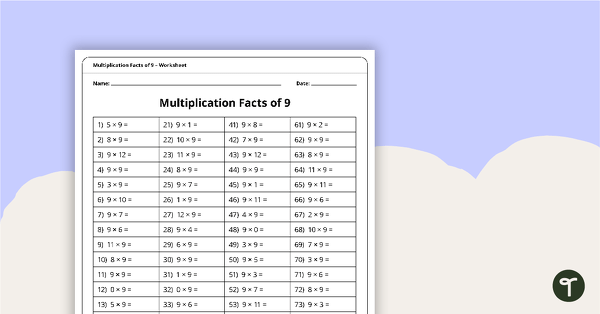
Multiplication and Division Speed Drill Worksheets – Facts of 9
A set of worksheets to help students develop fast and accurate recall of the nine times tables.
- Plus Plan
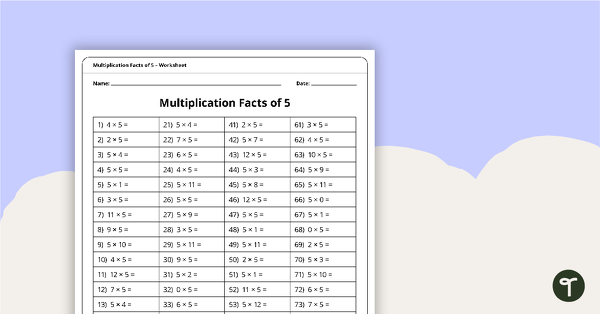
Multiplication and Division Speed Drill Worksheets – Facts of 5
A set of worksheets to help students develop fast and accurate recall of the five times tables.
- Plus Plan
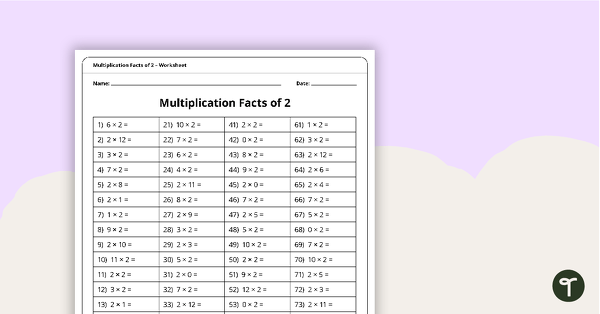
Multiplication and Division Speed Drill Worksheets – Facts of 2
A set of worksheets to help students develop fast and accurate recall of the two times tables.
- Plus Plan
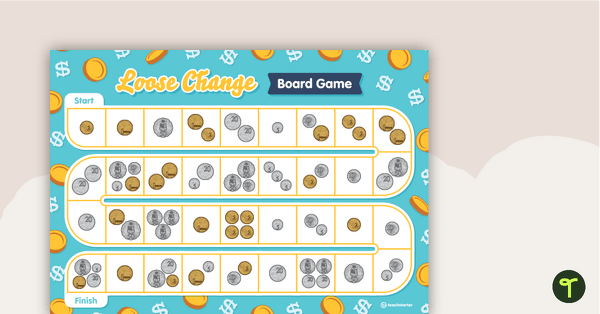
Loose Change (Coins) – Board Game
A board game to encourage students to learn about Australian coins.
- Plus Plan
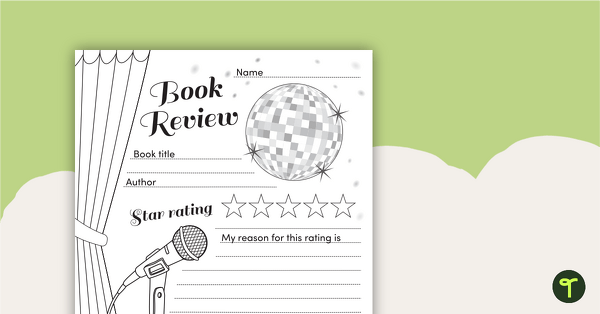
Stage-Themed Book Review Worksheet
Use this book review worksheet with children after they have read a story.
- Plus Plan
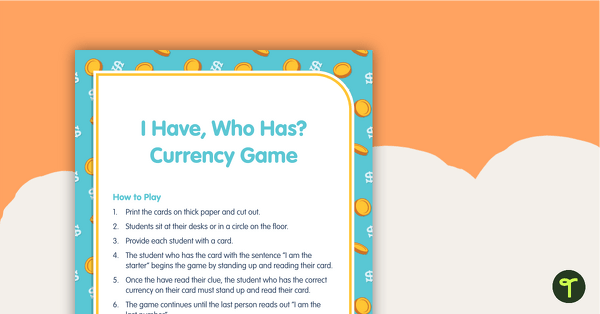
I Have, Who Has? Game - Money (Australian Currency)
A whole-class game to help students when learning to count coins and notes.
- Plus Plan
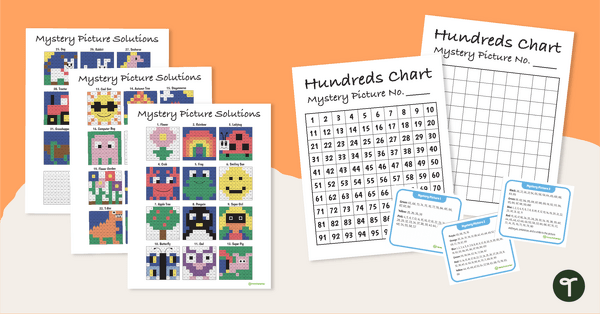
Hundreds Board Mystery Picture Task Cards
A set of 32 activity task cards that require students to colour in a hundreds chart to reveal a mystery picture.
- Plus Plan
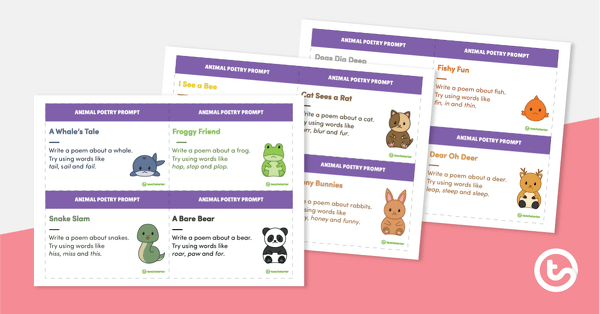
Animal Poetry Task Cards
Get your students writing simple animal poetry with this set of 12 poetry prompt task cards.
- Free Plan
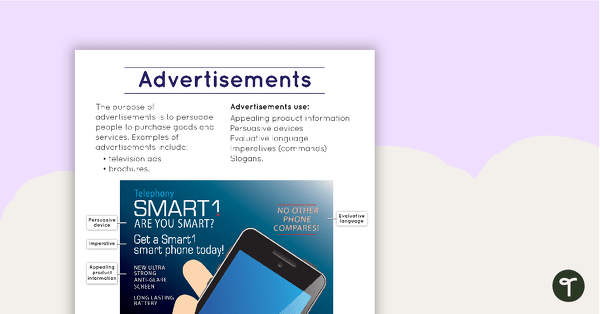
Advertisement Text Type Poster With Annotations
A poster about advertisements, including an annotated example.
- Plus Plan
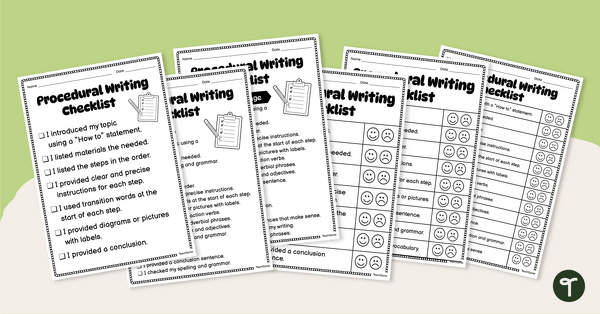
Procedural Writing Checklists
Use these procedural writing checklists when teaching your students how to editing their procedure texts.
- Free Plan
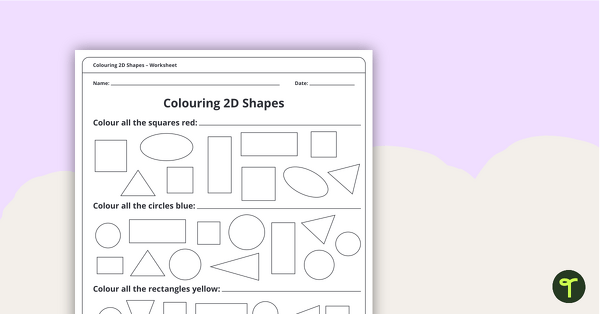
Colouring 2D Shapes Worksheet
A worksheet to consolidate students' understanding of rectangles, squares, circles and triangles.
- Plus Plan
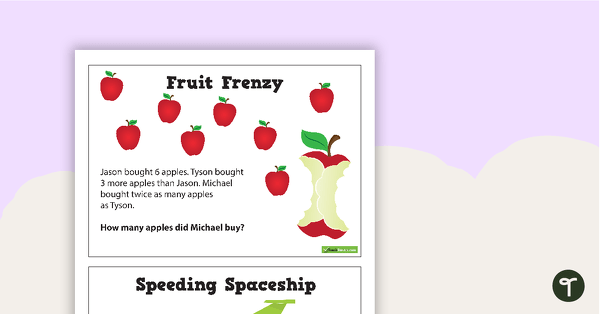
Maths Brain Teasers – Middle Primary
A set of 10 fun brain teasers for your students in middle primary.
- Plus Plan
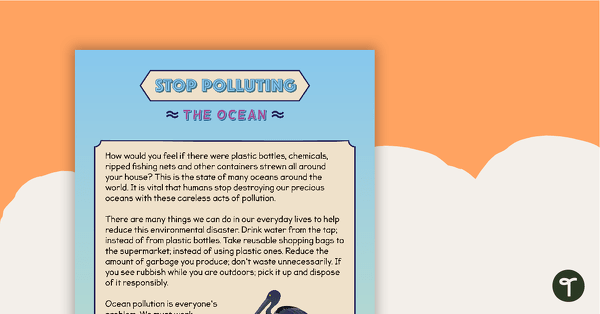
Comprehension - Stop Polluting The Ocean
A comprehension activity using a persuasive text.
- Plus Plan
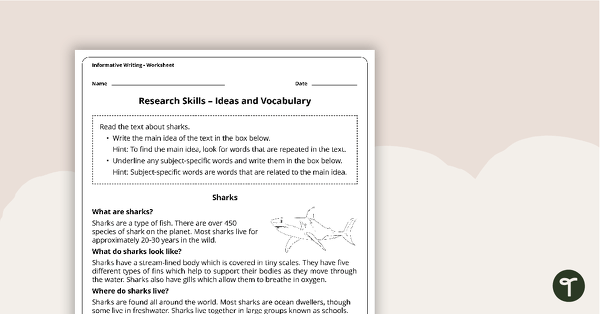
Note-Taking Practice Worksheets
Use this set of note-taking practice worksheets to help your students identify key facts, details and vocabulary when researching information.
- Plus Plan
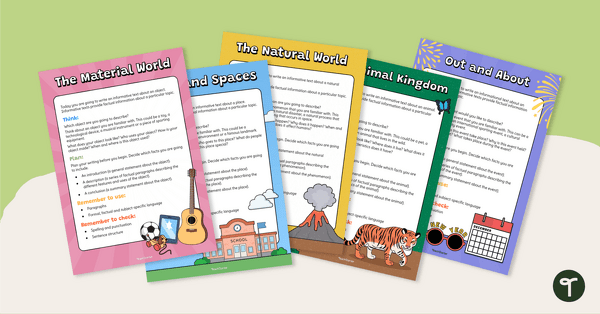
5 Information Report Writing Prompts
Use this set of 5 writing prompts to assess your students’ informative writing skills.